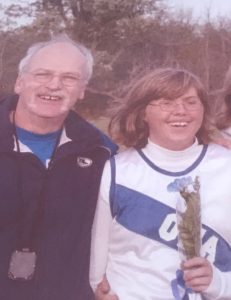Running Cross-country was a similar experience to running Winter and Spring Track; however, the bumps I encountered were different. My gross motor and spatial skills deficits were often the triggers for these bumps. These skills are necessary to navigate the course and to run hills successfully. Because Cross-Country is trail running, gross motor and spatial deficiencies become more of an issue. While this challenge may seem discouraging, the successful memories will outweigh the hard times, like in Track.
For example, a real bump I faced running Cross-country was navigating the course successfully from start to finish as sometimes I got lost. As a result, I occasionally ran 4 miles rather than the actual course length of 3 miles. Sometimes I even had to drop out of the race as too much time had gone by. It was unrealistic to think I would make it to the finish line. This scenario was especially hard as dropping out caused our team not to be able to score as we only had four runners, and five were required for a complete team. Rather than quitting, I focused on all the reasons Cross-country was a great sport for me and never gave up.
Another bump I faced during my time on the cross-country team was that being a slow runner had more of a negative impact in Cross-Country than during Track. Given the nature of the sport, the distance I fell behind the other runners was more noticeable. It was clear my coach Jim loved my “Yes I can” attitude as much as my Track coach Penny did. Jim would often run with me so we would enjoy many great conversations together, and it encouraged me to just keep going. Many of the top runners also could support me as I crossed the finish line, and I became great friends with a few of them. I soon realized Jim and other coaches were right about cross-country. Cross-country is about doing your best and being caring and supportive. Jim and the other runners made me love the sport.
The next was running hills, and sometimes it was so bad that I had to walk going up as I didn’t have the balance and overall motor control to run them well. Thankfully I noticed this bump was a minor inconvenience and a normal one. This allowed me to work very closely with my coaches and teammates, which made running hills easier for me because I knew I had a great support system that motivated me to overcome this bump. However, what really helped is how Jim always said to us, “Let hills be your friends” during the workouts with us. His positivity made us all laugh, and gradually this made hills be a real positive experience for all of us as we conquered the challenge together. Years later, I still think of his comment when I need to conquer a big hill, and it reminds me why my memories of Cross-Country are special.
Therefore my advice is to always work hard and trust your coaches as this will lead to tremendous success, and the possible difficulties will become a distant memory. I know how true this is as Jim because he loved my Yes I can attitude and also always coached me like I was a top runner just like Penny did. I remember being on the Cross-Country and track teams as a five-time award winner, laughing with my coaches, the post-race hugs from my coaches and the other distance runners, and how my coaches were and are my biggest supporters. In addition, I remember how my drive and dedication were greatly valued not just by my own coaches but by other coaches throughout our section. Both Jim and Penny share the same memories as me, and years later, I think how lucky I am that they both took me under their wing as it gave me “typical” teenager experiences, and I learned so many life lessons in the process. It is certainly not easy, however with your coaches’ support and your own determination, you will succeed and begin to understand me.
Eileen
Eileen is a Project Social Ambassador and blogger for The NVLD Project. She loves helping others understand they can achieve their goals and dreams through hard work and dedication.








